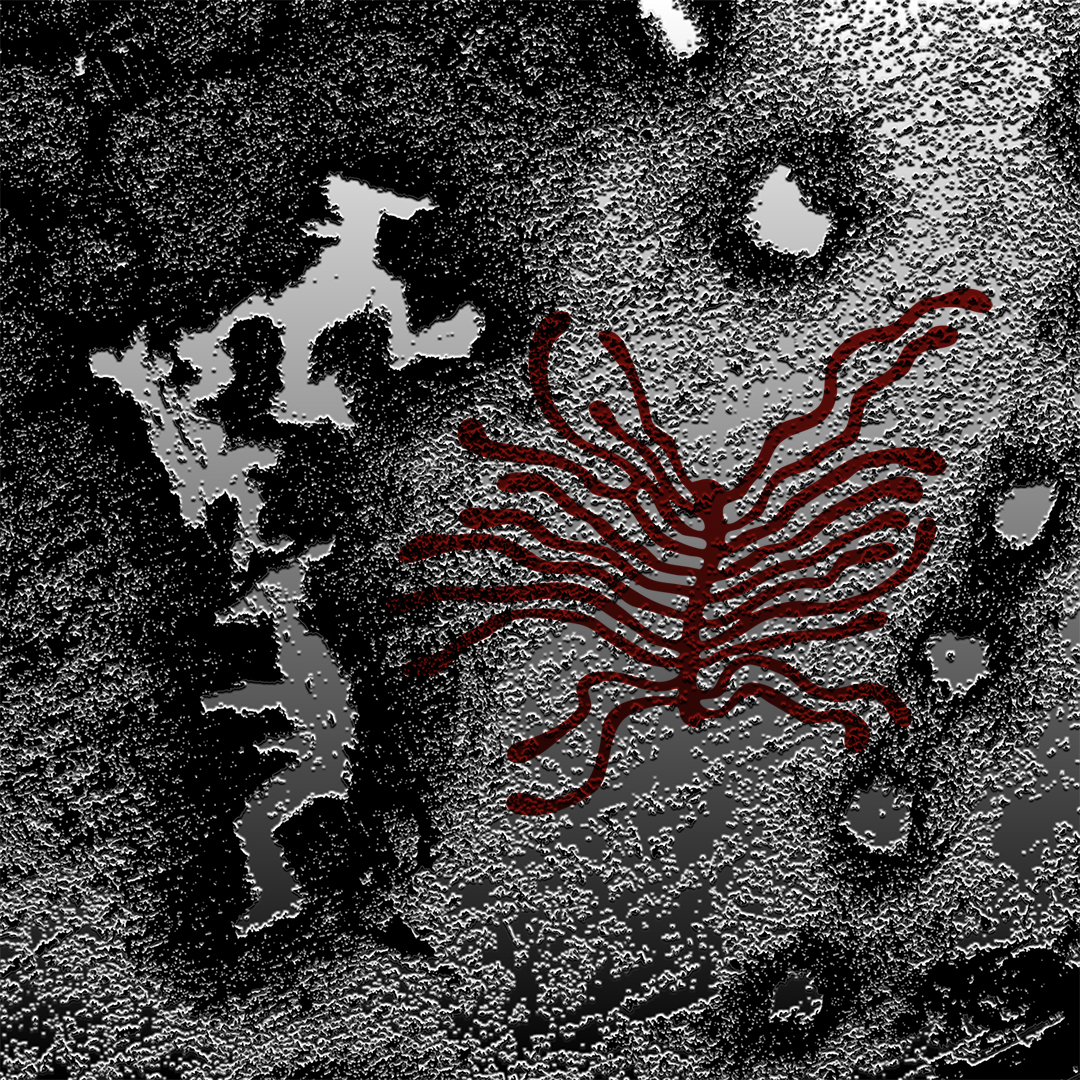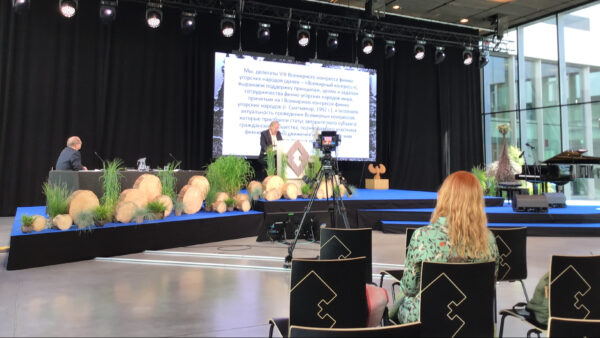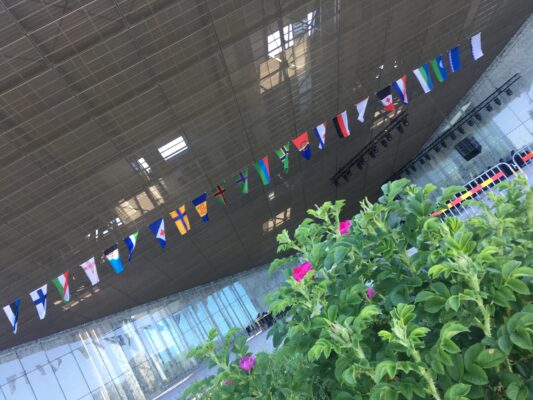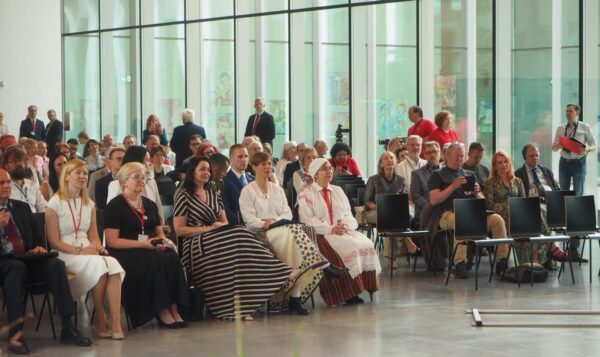
Resolution 2021
of the VIII World Congress of Finno-Ugric Peoples
Resolution of the VIII World Congress of Finno-Ugric Peoples
We, the delegates of the VIII World Congress of Finno-Ugric Peoples (hereinafter – the “World Congress”), express our support for the principles, aims and objectives of cooperation between the Finno-Ugric peoples of the world, adopted at the I World Congress of Finno-Ugric Peoples (Syktyvkar, 1992), and acknowledge the relevance of holding the World Congresses, which have acquired the status of an authoritative actor in civil society, a full-fledged participant in the Finno-Ugric movement and related socio-cultural processes.
The World Congress positively assesses the position of scientists who have proved the kinship of the peoples of the Finno-Ugric and Samoyed groups.
We recognize the important role of the World Congress and the Consultative Committee of the Finno-Ugric Peoples (hereinafter referred to as the “Consultative Committee”) in supporting and developing effective cooperation between the Finno-Ugric and Samoyed peoples across political borders, which has been going on for many decades and will continue in the future. It should be noted that the Consultative Committee and the World Congress are also significant instruments for supporting transboundary peoples and their fruitful cooperation.
The Consultative Committee successfully supports representatives of the Finno-Ugric and Samoyed peoples of the socio-cultural region “Indigenous Eastern Europe, Russian Federation, Transcaucasia and Central Asia” at various high-level international platforms. The Consultative Committee actively participated in two UN working groups: on the finalization of the Declaration on the Rights of Indigenous Peoples (1995-2000) and on the establishment of the UN Permanent Forum on Indigenous Issues (UN PFII).
The World Congress has become a platform for the international community to understand the problems of Hungarians living on their native lands in the neighbouring states of Hungary. The admission of the Setos to the Consultative Committee was a significant support for the international recognition of the Setos as a people. The active position of the Consultative Committee helped to draw attention to the Livonian issues in Latvia.
The World Congress notes that thanks to the experience gained and constructive work in the Consultative Committee, its members intensified in the regions the work on the development and adoption of laws in the field of the rights of indigenous peoples, contributed to the creation of centres of national culture and craft, the Finno-Ugric cultural centre of the Russian Federation, gave a new impulse for the creation and further activities of scientific, educational, creative associations, organizations of traditional economic activities of indigenous peoples, the development of a network of public organizations of the Finno-Ugric and Samoyed peoples.
The World Congress declares that the commitment to human rights, national minorities and indigenous peoples, freedom of speech, dignified development of languages and traditional culture, mutual respect between peoples and countries remain key guidelines in the activities of the Consultative Committee and the World Congress.
The World Congress supports the diversity of forms of intercultural cooperation of the Finno-Ugric and Samoyed peoples, civil society institutions, government bodies, the academic community in order to ensure peace, prosperity and sustainable development, including the preservation of a favourable environment for the contemporary representatives of our peoples and for future generations.
The World Congress welcomes the holding of constructive discussions on both traditional and newly created platforms, the organization of which is aimed at supporting mutual understanding and developing cultural ties. The participation of representatives of our peoples in them contributes to the strengthening of the Finno-Ugric movement.
We acknowledge Finno-Ugric Capitals of Culture as a good and sustainable practice of Finno-Ugric cooperation, contributing to the development of both the settlements, which have carried the cultural capital title, as well as the entire local community. We call on representatives of states and local communities to participate actively in the continuation of this cultural cooperation programme.
The VIII World Congress of Finno-Ugric Peoples, the theme of which was “Cultural Landscapes – Mind and Language“ expresses full support for the International Decade of Indigenous Languages 2022-2032, proclaimed by the UN General Assembly Resolution (A / 74/396, 12/18/2019). The Consultative Committee works closely with UNESCO in preparation for the International Decade of Indigenous Languages. Since 2020, focusing on the rights of native speakers among indigenous peoples, acknowledging that each nation as a native speaker of a language and culture is unique and requires the same unique approach for solving linguistic issues, we got involved in the formation of the Global Plan of Action and the development of practical solutions.
The World Congress calls on states to adhere to generally accepted standards for the use of languages of national minorities in places of their historical residence.
All recommendations of the working groups (sections 1, 2, 3 and 4) of the VIII World Congress of Finno-Ugric Peoples are an integral part of this Resolution.
Tartu, Estonia, 18. VI 2021
FINNO-UGRIC PEOPLES IN A CHANGING ENVIRONMENT
RECOMMENDATIONS A respectful attitude towards nature, free access to traditional natural resources and their reasonable consumption are essential elements of the identity and value system of the Finno-Ugric and Samoyed peoples. Ensuring an inextricable connection with the natural environment, free access to traditional natural resources and traditional food systems are the core basis in the process of preserving the cultures of the Finno-Ugric and Samoyed peoples. The transfer of intangible cultural heritage from generation to generation is first of all possible in the territories of traditional habitats of the people with the direct involvement of the carriers of culture themselves in decision-making related to this territory and their interests. The preservation of an accessible socio-cultural natural environment, a favorable environment for cultural bearers is a mandatory precondition for organizing of any economic activity in their areas of residence. The last decades have been characterized by an active transformation of natural landscapes, a decrease in biodiversity, and the disappearance of natural objects, caused by increased anthropogenic impact. Intensive industrial development in new territories and in waters with associated construction activities and pollution directly damages the physical and emotional well-being of the local people in places populated by Finno-Ugric and Samoyed nations. Deterioration of the environment and damage to traditional food systems entails negative demographic consequences and a threat to the preservation of the gene pool. The development of environmental education for all members of society on the basis of the formal and non-formal educational systems is becoming especially important. In this regard, the Section “FINNO-UGRIC PEOPLES IN A CHANGING ENVIRONMENT” has developed the following RECOMMENDATIONS: VIII World Congress of Finno-Ugric Peoples: 1. Calls on the states and regions inhabited by the Finno-Ugric and Samoyed peoples to implement the principle of Free, Prior, Informed Consent (FPIC). 2. Calls upon the states and regions inhabited by the Finno-Ugric and Samoyed peoples to practically ensure the participation of representatives of these peoples in the processes of developing a regulatory framework, programs, strategies for regional economic and social development, as well as investment plans in order to guarantee fulfilment of interests of the local population. 3. Calls upon the states with Finno-Ugric and Samoyed populations to ensure that interests of Finno-Ugric and Samoyed peoples are reflected in realization of actions plans for implementation of the 2030 UN Sustainable Development Goals (SDGs). 4. Calls on the states with Finno-Ugric and Samoyed populations to commit to achieving climate neutrality by 2050 or earlier to avoid potentially devastating consequences of the climate change. 5. Assessment of the existence and condition of territories and waters for traditional resource use shall be jointly conducted by competent state and municipal authorities with the participation of public organizations with the aim of subsequently establishing special restrictive measures to ensure the sufficiency and inviolability of territories and waters for unconditional access of the local population to traditional natural resources. 6. Calls on the Finno-Ugric and Samoyed peoples to prefer goods and services provided by the most environmentally friendly methods and/or by local producers carrying out traditional economic activities. 7. Calls on the states and regions inhabited by the Finno-Ugric and Samoyed peoples to establish requirements to take into account the opinion of the local population living in the territory of the planned investment activity and on the absence of damage to objects of tangible and intangible culture as prerequisites and for obtaining permits for the implementation of an investment plans. 8. Stresses that because of the central role of nature as living environment, food system and spiritual enlightenment, provision of environmental education to younger generations of Finno-Ugric and Samoyed people is crucial for survival of these nations. 9. Calls on educational authorities of countries with Finno-Ugric and Samoyed people to fully incorporate teaching of traditional nature use and respectful attitudes towards nature into curricula of formal education and to cooperate with providers of non-formal education in ensuring the wide access to respective education for population. 10. Suggests to educational and environmental authorities of countries with Finno-Ugric and Samoyed people to exchange best practice, methodologies and materials for provision of environmental education.


